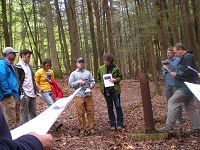Dr. Kip Solomon visits Penn State and the CZO to participate in 2013 All Hands Meeting
13 May 2013
News Source: Penn State | News
Dr. Kip Solomon, groundwater hydrologist with the University of Utah, visited Penn State and the CZO as invited participant in the annual ALLHANDS SSHCZO meeting. As invited guest, Dr. Solomon gave the opening seminar entitled "Adding Time to Geochemical and Hydrologic Processes using Environmental Traces" to a diverse audience from several colleges across the university.
Abstract
Environmental tracers can provide a measure of time to geochemical and hydrologic processes as a result of changing concentrations in the atmosphere (and hence recharging groundwater) and/or due to radioactive decay and production. A growing number of these tracers are available for hydrochemical studies on time scales of about 1 to 60 years. This presentation will review the basic concepts behind the use of environmental tracers and will demonstrate their use for understanding reaction rates of low-temperature weather of silicates and water resources and groundwater/surface water interactions.
Short Bio
Kip Solomon is currently a professor at the University of Utah and Chair of the Department of Geology and Geophysics. His education includes a Ph.D. (1992) in Earth Sciences from the University of Waterloo, an M. S. (1985) in Geology from the University of Utah, and a B.S. (1979) in Geological Engineering from the University of Utah. In 2006 he was the Chair of the Hydrogeology Division of the Geological Society of America, was the 2005 Darcy Lecturer for the National Groundwater Association. He has represented the United States on numerous committees at the International Atomic Energy Agency regarding the use of tracers in water resources and has served on several panels for the National Research Council of the United States. He worked on the development of the tritium/helium-3 groundwater dating method during graduate studies and has subsequently been involved in using environmental tracers in a variety of hydrologic and geochemical environments. He currently has projects in Central and South America, Eastern Europe, and in the western United States.
News Source:
READ MORE from Penn State | News >>
News Category:
RESEARCH
Explore Further

